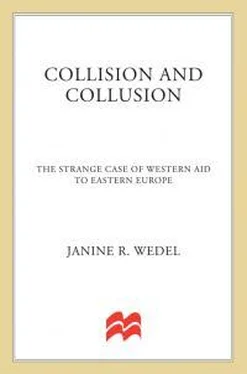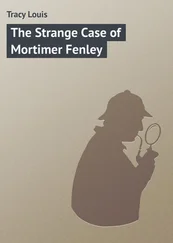While recipient officials complained of too little matchmaking with potential investors, there could be a price if consultants got too involved with local officials—especially if those officials were perceived to be on the take. A reason often given for outsourcing government work is that outside contractors provide neutral expertise52—and so it was claimed in the case of the Big Six and other contractors working in the region. But the fact was that consultants working on issues such as privatization, if they were to play a role, had to work with dealmakers with insider access.
Especially in the early days of the East-West encounter, some Eastern officials and managers took advantage of lucrative opportunities. Under nomenklatura 53 privatization, for instance, enterprise managers acquired enterprises or parts thereof as their own private property. In one version, company insiders procured shares of newly converted companies at firesale prices. In another variant, company insiders formed spin-off private companies, some with expatriate associates. These spin-off companies then made sweetheart deals with the old state enterprises and depleted their resources by leasing state machinery at bargain-basement prices; the new company owners served as intermediaries between the state and private sector.54
For Eastern officials, Westerners could be a potentially useful source of contacts and more lucrative opportunities than government employment could offer. Such officials often held “side jobs”; some even owned consulting firms that did business with the very ministries in which they worked. Foreigners were routinely asked for help or subtly probed for what they might be able to provide by way of contacts, potential business partners, or clients. After interviews during which some personal rapport developed, the officials would frequently proffer their “private” business cards in addition to their official cards. Especially in the early days after the revolutions of 1989, such activity was considered “normal” in Central Europe.
With Central and Eastern European financial and regulatory institutions, banks, and government bureaucracies in flux, sensitive information, favorable deals, and speedy outcomes to any number of administrative matters could be “arranged” through contacts. Westerners who were effective in the new frontier often were those who learned to strike deals in a shadowy world of nods and winks where what counted was not formalized agreement but dependable complicity.
Information about the operations of the target ministries handling privatization and economic restructuring generally could be obtained only by knowing the right people. Privatization aid, if it was to have an impact, had to rely heavily on personal relations developed between consultants and well-placed host individuals. The result was that some employees of the consulting firms got involved in insider deals that compromised the firms’ image of impartiality.
The use of Big Six firms that gathered information but often effected few palpable results rendered the donors’ claims of providing help suspect. The deputy director of Poland’s NIK (the Supreme Control Board, the Polish government’s chief auditing agency and rough equivalent to the GAO) confirmed in 1994 that “[a] few years ago the [consulting] firms had an industrial espionage quality to them. They came and got all [the] valuable information about the enterprises—the state of the firm, the amount and cost of production, and so on—and after this they disappeared. This is also the fault of Polish officials. Today there are fewer naive officials who allow this to happen.”55
Across the region, charges of industrial espionage were common. High-ranking officials in the region sometimes suspected advisers sent from Western bodies, ranging from the IMF and the EU to multinational corporations, of spying to assess the Central and Eastern European nations’ potential competitiveness with regard to certain products. Such officials even intimated that the “advice” they received could be intended to sabotage their nation’s future competitiveness. One Polish manager who worked with foreign consultants was convinced that Central and Eastern Europe had become a “paradise for [Western] spies.”
The involvement of Western law firms, under contract to donor organizations to help write legislation in the region, especially gave rise to charges of dubious double dealing. Legal Times, a publication dealing with the activities of law firms, devoted a number of articles to the American foray into Central and Eastern Europe. Investigative reporter Sheila Kaplan observed in 1991:
Some law firms find work [in Central and Eastern Europe] writing laws and regulations that longtime clients will soon be following. Others post advisers to Eastern European ministries, while preparing clients to do business deals with them. And it’s not always clear that the U.S. firms are telling their government clients all they need to know about the firm’s private clients, although many firms insist they are up front about their private client-driven agenda.… Nowhere is the ethics picture more murky than in the booming business of advising foreign ministries on financial matters like privatization and joint ventures.56
Sometimes these law firms had clients already doing business in the region or were developing clients who were potential buyers of companies at the prices set by the Western consultants. Because such a situation created an incentive to understate a property’s full value, there was a built-in conflict of interest. Indeed, many of these firms appeared to be more concerned with representing the interests of their clients back home than those of the countries they allegedly came to help. The situation was so suspect that even public officials working on aid projects were inclined to air their doubts, albeit tactfully. As Polish aid official Paweł Samecki put it: “Public opinion thinks that if the British are involved in the privatization of state-owned banks that they must get something out of it, which is not necessarily true.”57
WHAT’S IT WORTH?
The practice of Western consulting firms assessing the value of Central and Eastern European state-owned companies was another problematic area. Most allegations of impropriety, whether with regard to valuation or to other activities, were based in part on the fact that consultants could not value assets without being privy to sensitive data. Many short-term consultants spent what little time they had gathering information; the local people they dealt with frequently never heard from them again. This lent credence to the conviction on the part of local officials and managers who hosted the consultants that the latter engaged in industrial espionage.
The fact that the various valuation methods could produce a wide range of results opened up enormous opportunities for abuse and corruption in the free-for-all unlocked by transformation in the region. The difficulties resulting from the lack of reliability and standardization of asset valuations even in stable, well-functioning market economies were compounded in Central and Eastern Europe.58 Many in the region believed that Western consultants continually undervalued local citizens’ high degree of skill and experience, trademarks, and land. Such belittlement irritated many Central and Eastern Europeans, who, while they may have resented the socialist system, also resented the tendency of aid providers to deny national accomplishments prior to socialism and to devalue what the region’s inhabitants had achieved in spite of that system’s limitations.
Both consultants and local government officials had abundant opportunities for dealmaking based on insider information—the kinds of activities typically considered conflicts of interest in Western democracies. Local parties to the privatization process, including managers and workers, sometimes saw the relationship between the Western consultants’ valuation of properties and their clients’ investment interests as suspect. In fact, some “free-market proponents” from the West tended to seek monopolies and exclusive deals in countries legally and institutionally ill equipped to monitor their activities. A potential conflict of interest lay in the fact that Western consulting firms doing asset valuations often had clients who were potential buyers at the prices the consultants established. Clearly, this situation created incentives to understate the full value of those properties.
Читать дальше












